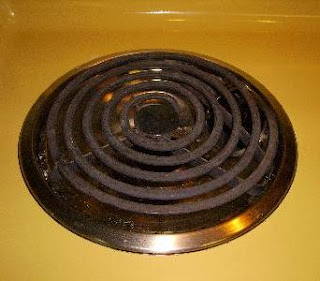There are many different hazards to our everyday survival. One of the most dangerous places people frequent is their own homes. We spend a lot of time each day at home and one of the places where we spend the majority of our time is in the kitchen. Some spend their time cooking and others spend their time eating. I’m better at eating than cooking but still spend a great deal of time in the kitchen. It is only prudent to take the necessary steps to make your stay in the kitchen a safe experience. Here are a few kitchen safety tips to help you avoid a hazardous experience and enable you to survive while in the kitchen.
Kitchen Safety Tips

1. A working smoke detector in your kitchen is a vital part of kitchen safety. Make sure you have a working smoke detector in your kitchen. Check it regularly to make sure it is working properly and replace it if isn’t. If it is battery operated, change the batteries out on a regular basis.

2. Keep a working fire extinguisher in the kitchen at all times. It pays to be cautious when it comes to your kitchen activities which will involve fire and flames. Check the fire extinguisher on a regular basis to make sure it is functioning properly.
Safety Tip: A small pan fire can be smothered by putting a lid on it or covering it with baking soda. NEVER put water on a grease fire. This will only make your problems worse.

3. Keep a small fire extinguisher close to the stove where it can be reached quickly.


5. Always use pot holders and oven mitts to protect yourself when handling hot pans or dishes. Make sure they are kept dry. Water is an excellent conductor of heat and a wet oven mitt or pot holder offers very little protection.

6. Cooking oils and grease when being used in the kitchen should be given your utmost attention. Remember that the warmer they get, the more dangerous they become.

7. Keep your kitchen tools and utensils where they can be easily accessed without reaching across a hot stove.

8. Glass lids for pots, pans or casserole dishes if left on a hot burner or fire may explode sending dangerous glass shards flying in all directions.
9. When cooking food in the kitchen, it is vital that you never leave your stove or oven unattended. If you do have to leave the stove, oven or the immediate area to deal with another emergency (screaming kids come to mind!), turn the stove or oven off till you are able to get back to what you were doing. Automatic timers are great timesavers but are also a good way to start a house fire if left unattended.
No matter what type of stove you have, always make sure that it is in proper working condition. Faulty controls, bad valves, non-working vents can all cause a fire hazard if they aren’t working properly. Keeping it clean of grease splatters, etc. will also help to reduce the risk of an unwanted fire.
Home Survival - Part Two - Kitchen Tool Safety will cover additional safety concerns.
Staying above the water line!


















2 comments:
Great post--hadn't thought about the glass lids, but it makes sense. Wouldn't want to do that without thinking about it--thanks as usual for all the great info!
To: Marie
In my part of the country it gets so hot that sometimes the glass windows in vehicles will shatter. It's something to remember and be careful about. Thanks Marie!
RW
Post a Comment